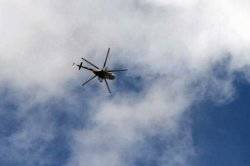Syrian opposition forces have said they downed an army helicopter with a ground-to-air missile for the first time as it was bombarding a besieged base in the country's northwest.
The downing came at the strategic Sheikh Suleiman base, 25km west of Aleppo, the last garrison in government hands between Syria's second city and the Turkish border.
It is reportedly the first time that the opposition forces have shot down a helicopter with a surface-to-air missile.
Footage posted by activists on YouTube showed opposition fighters shouting: "We hit it, God is greatest," as a helicopter plunged to the ground in a ball of flames.
Meanwhile in Damascus, opposition forces battled government forces in the neighborhood of Kfar Souseh, on the edge of the center of the capital.
Fighting was also reported in the neighborhood of Bab Amr in Homs city, an area that was overrun by government troops in February.
Earlier on Tuesday, a government jet fired barrel bombs - cylinders packed with explosives and petrol - at the Abu Hilal olive oil press, 2km west of Idlib city, activist Tareq Abdelhaq said.
Abdelhaq said at least 20 were killed and 50 wounded. The victims were civilians, according to activists, who acknowledged rebel fighters were in the area.
Opposition forces have captured at least five army and air force installations in the past 10 days, putting pressure on President Bashar al-Assad forces in the northern provinces of Aleppo and Idlib and the eastern oil region of Deir al-Zor.
Lethal aid
Opposition forces are calling for international military support, particularly against air attacks, but the west is so far hesitant to provide rebels with lethal aid.
On Tuesday, diplomats said that the UK was pushing the European Union to hold frequent reviews of its arms embargo on Syria.
The proposal, which is said to have been driven by Prime Minister David Cameron, marks a hardening of Britain's position and shows how the formation of a united Syrian opposition has galvanized overseas support for the opposition forces.
EU sanctions on Syria include visa bans and asset freezes on individuals and businesses connected to Assad's government, a ban on oil imports from Syria, and an embargo on the supply of arms to the country, imposed to prevent the flow of weapons to Assad's forces.
Under EU rules, the Syria sanctions package has to be extended for a year by December 1.
Britain, however, has proposed to review the arms embargo segment of the restrictions every three months and has received French backing.
EU diplomats debated the proposal on Tuesday and were expected to continue discussion on Wednesday.
However, many capitals expressed their reluctance about the proposal, the diplomats said.
France was the first EU country to recognize the new opposition group, the Syrian National Coalition, after its formation on November 11. Few days later, Laurent Fabius, the country’s foreign minister, suggested lifting the arms embargo to allow the supply of arms to rebels.
Protecting refugees
Opposition activists say 40,000 people have been killed in the revolt against the rule of Assad, which started out as peaceful protests 20 months ago only to descend into full civil war.
Hundreds of thousands of others have fled the violence in the country.
On Tuesday, Valerie Amos, the UN humanitarian chief, accused Syria of firing mortar bombs near the border with Jordan to prevent refugees from fleeing the country.
In an interview with the Reuters news agency at the Jordanian refugee camp of Zaatari, Amos said that during a visit to the border the night before she was able to see "what was definitely mortar fire on the Syrian side of the border to try to prevent people from crossing."
"We need the agreement by all those involved in the conflict to ensure they will not in any way bomb or shell or fight [refugees]," she said.
World powers are divided over the crisis and have been unable so far to agree on action to halt the violence, with Assad's allies Russia and China having vetoed three UN Security Council resolutions.
"We will do all we can to help the refugees and people of Syria but this requires the international community to work together to find a political solution which meets the needs of the Syrian people," Amos said.
She said that a UN appeal for Syria's 2.5 million internally displaced people has only been 50 per cent funded, and that the world body was planning for numbers of up to four million.
PHOTO CAPTION
A Syrian army helicopter flies over the northern city of Aleppo in October 2012.
Aljazeera


 Home
Home Discover Islam
Discover Islam Quran Recitations
Quran Recitations Lectures
Lectures
 Fatwa
Fatwa Articles
Articles Fiqh
Fiqh E-Books
E-Books Boys & Girls
Boys & Girls  Hajj Rulings
Hajj Rulings Hajj Fatwas
Hajj Fatwas














